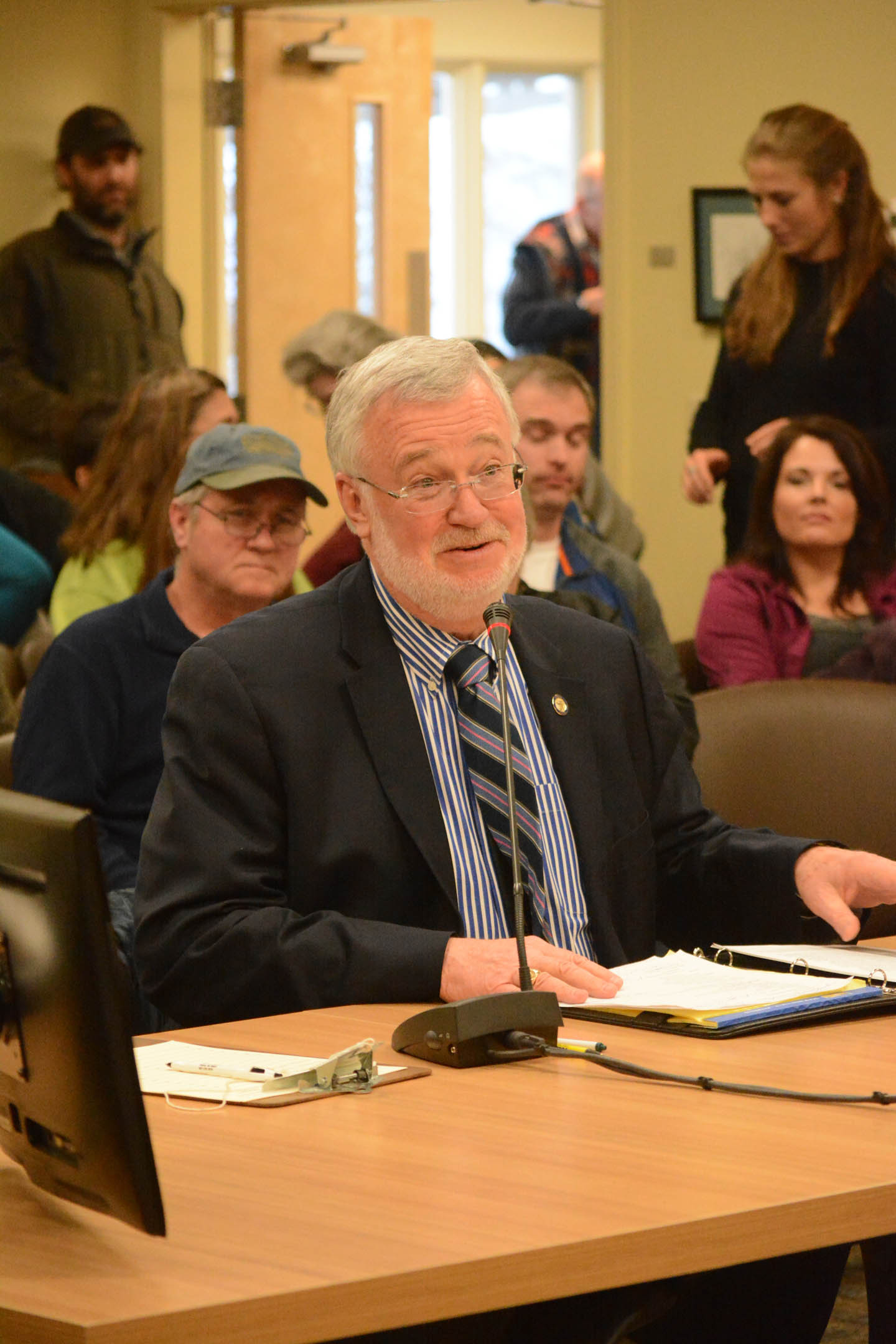In visits this week around Homer by Sen. Gary Stevens, R-Kodiak, his stump speech could be summed up as bad news, worse news.
“I’m really surprised people haven’t run me out of town on a rail, because the news we’ve got is not good,” Stevens said in a talk Tuesday at the Homer Chamber of Commerce and Visitor Center’s monthly meeting. Stevens also held a town hall meeting Monday afternoon and then spoke Monday night at the Homer City Council meeting.
The bad news? Revenue for the next fiscal year will be $2.2 billion, Steven said.
“If we take the top three issues we have to spend money on — education, Medicaid and our debt reimbursement — there’s nothing left,” he said.
Put another way, that’s also the current personnel budget.
“It is very, very bad. If we were to fire everyone who works for the state of Alaska, including me and the governor, we would only solve half our problem,” he told the council.
And the worse news?
Stevens said Gov. Bill Walker has said that unless oil revenues get better, there will be spending cuts this year, more spending cuts next year and after that, the state will have to look at other sources of revenue, like income taxes or dipping into the Alaska Permanent Fund. A 20-percent tax based of the federal income tax rate would only raise $1 billion, Stevens said.
“How do we talk about revenue? This is not a campaign speech,” he said. “I don’t want to be too negative, but things are bad right now.”
Well, not totally bad. The one hope in the current revenue situation is that with previous high oil prices, the state socked away $16 billion in savings.
“That happened when I was Senate President. I take full credit for that,” Stevens said, joking. “The reality is, we only have that money because we had high oil prices.”
Oil revenues could improve, but no one can be sure if and when that would happen, Stevens said.
“I can’t tell you where it’s going. I have no idea,” he said. “We’re hoping it returns. It would be a lot easier for us.”
Falling revenues mean cities can’t expect anything in legislative grants.
“This is not the year for it,” Stevens said. We’re going to have to tighten our belts and get through this.”
The House of Representatives already has done some belt tightening. Stevens noted proposed cuts to education programs like the Parents as Teachers program and Best Beginnings. Vocational education programs also have been cut.
“We’re really concerned about that,” Stevens said. “If there’s anything we can agree on, we really have to provide for our children’s needs.”
Those cuts might be restored, but if so, the money would have to come from elsewhere. Alaskans also can expect to see cuts of about $25 million in the Alaska Marine Highway system. That could mean no local ferry service for three months while the M/V Tustumena is out of service, Stevens said.
Aside from fiscal gloom, Stevens also spoke on other issues. He noted the intense focus on writing regulations for commercial marijuana production, processing and sales. Stevens acknowledged the strong support for Ballot Measure 2 in Homer precincts.
“Marijuana got 1,000 more votes than I did,” he said. “The good news for me was that marijuana got 2,000 more votes than Walker did.”
Moving toward writing commercial marijuana rules will be complex, Stevens said, and look at questions like “Is there going to be a (cannabis) store in downtown Homer? What’s going to be the impact on our kids?”
Another issue is Medicaid expansion as allowed under the Affordable Care Act. Stevens said he supports Walker’s plan to expand Medicaid to low-income Alaskans. That could lead to some cost savings, like Medicaid paying for prisoner health-care costs, now paid for by the state. Alaskans pay for people not covered through higher hospital bills, Stevens noted.
Some legislators want to tie Medicaid expansion to Medicaid reform.
“I think we can do both,” Stevens said. “I think we can do Medicaid expansion before we do Medicaid reform.”
Looking toward the future, a proposed large-pipe natural gasline to Nikiski and a liquid natural gas export facility could mean huge economic growth for the Kenai Peninsula and Homer. As many as 200 LNG ships could be coming into Cook Inlet a year, with support facilities like spill prevention boats and tugs. Supplies like pipe could come through Homer, too.
“I think the impact on Homer could be enormous,” Stevens said. “I hope you’re aware that if this happens, it could be a different Homer than you’re used to.”
Walker supports the LNG project but not a small in-state pipeline to supply natural gas to the Railbelt.
“The governor has said it doesn’t make sense to do in-state,” Stevens said. “We have to have some export at the other end to make it work.”
The House leadership and Walker have been in disagreement over that.
“You just want to say, ‘Grow up and take a deep breath,’” Stevens said. “The comment we have in the Senate is that in the House, ‘Everything has been said, but not everybody has said it.’”
Stevens praised Walker’s performance so far, noting his support by Homer in the election.
“I think the governor is doing a great job,” Stevens said. “He’s honest, he’s Alaskan, he wants to make things work. I think we made the right choice. I hope he’s there for the next eight years.”
Michael Armstrong can be reached at michael.armstrong@homernews.com.


